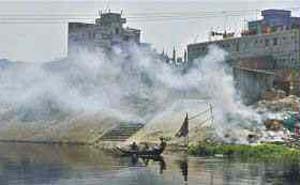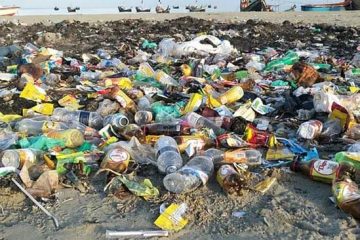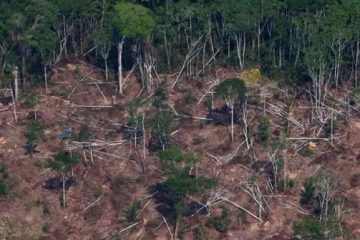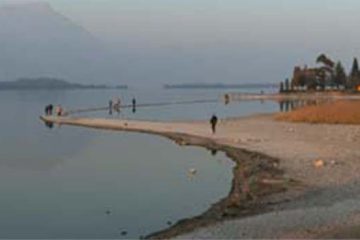Global Warming
Contemplating mitigation measures
Md. Atikur Rahman
 All things that make up the environment are interrelated. The way in which people, animals and plants are related to each other and to their surrounding is known as
All things that make up the environment are interrelated. The way in which people, animals and plants are related to each other and to their surrounding is known as
ecology. The ecosystem is a complex web that links animals, plants and every other life form in the biosphere. By altering any one part of the web you can affect all
other parts. For example, the destruction of forests may have serious ecological consequences for humans and animals.
It is our responsibility to prevent the environment from being spoilt. To make life healthy and comfortable we should keep the environment clean and danger free.
But often people spoil the environment by doing unwise things and as a result, endanger their own lives. In recent years, many alarming reports provide strong evidence
that world temperatures are increasing day by day. This increase in global warming is caused by increased amounts of carbon dioxide around the earth.
This is exemplified by the destruction and burning down of tropical rain forests, by traffic that clogs up city streets, by the rapid growth of industry, the use of
chlorofluorocarbons (CFCs) in packaging and manufacturing, the use of detergents and so on. The oceans are also said to be affected both human waste and because of
pollution caused by industrial waste products, oil seeping from damaged supertankers and from other maritime disasters. However, the main culprit for global warming is
carbon dioxide gas, produced by the burning of fossil fuels and forests and pollutants such as methane and chlorofluorocarbons.
Climatologists predict that by midway through the next century temperatures may have risen by as much as 40C. This could catastrophically reduce mankind’s ability to
grow food, destroy or severely damage wildlife and wilderness, raise sea levels and thereby flood coastal areas and farmland, the lower southern part of Bangladesh
included.
If the world is going to prevent dangerous human interference with the climate system, we must agree to limit emissions so as to respect ecological limits. In order to
avoid the most dangerous impacts of climate change, the latest science tells us that carbon emissions in industrialized countries will need to drop by at least 90
percent by 2050.
The United Nations aims to get countries to reduce their emissions of climate changing gases via the Kyoto Protocol. But the target for CO2 reduction is currently set
at only 5.2 per cent below 1990 levels by 2012 for the industrialised countries. Countries have still not achieved consensus on a way to move forward past 2012.
From another perspective, while the use of fuel increases to keep up with modern demands, the world is becoming more vulnerable to environmental hazards and disasters.
At present, oil provides above 40 to 43 percent of all energy used by the world. Oil and coal each account for 40 percent of global warming emissions from fossil fuels
worldwide. In the United States, energy use accounts for 82 percent of our global warming emissions, with oil counting for 42 percent of those emissions. Countries in
the tropics and the small island states are likely bear the brunt of the consequences.
Developing country economies are harmed when they are dependent on volatile oil imports. And when the oil is finally burned, and the carbon contained in it released
into the atmosphere, it contributes heavily to decreased agricultural production, increased droughts, human health impacts, environmentally related refugees and other
already observed and predicted impacts of climate change.
One of the most effective solutions to these environmental hazards is to raise the price of fuel. The use of petroleum releases toxic chemicals into our atmosphere.
These chemicals escape into the air during refilling, from the gasoline tank and carburetor during normal operation, and from engine exhaust. Transportation sources
account for about 30-50% of all harmful emissions into the atmosphere.
Raising the price of fuel would mean that people would use less petroleum. They would find other alternative means of transport to save money, which would mean using
less high priced fuel for everyday purposes. For example, cycling is a healthy activity and it saves the earth too. Also for a long journey, people could try to find
friends together for car-pooling. Car-pooling saves a lot of fuel and would save a lot of money too.
Many environmental hazards like “smog” are increasing around the would due to excessive use of petroleum in our daily lives. Raising the price of the fuel may make all
the difference to the environment. It would force people to use petrol in more responsible way and use it less, and thereby provide one of the most effective solutions
to the problem of ever-increasing environmental hazards.
We feel the government and its specialised agencies, non-governmental organisations, industries, educational institutions and individuals should act immediately to
counter the on-going degradation of the atmosphere.
Target for energy-efficiency and energy supply improvement should be fixed. The desired reduction in carbon dioxide emissions will also require switching to fuels that
emit less carbon dioxide; reviewing strategies for the implementation of renewable energy, especially advanced biomass conversion technologies; and reviewing nuclear
power. If safety, radioactive waste and unclear weapons proliferation problems can be solved, unclear power could play a role in lowering emissions of carbon dioxide.
There must be vigorous application of existing technologies to reduce emissions of acidifying substances, other substances that are precursors of troposphere ozone,
and greenhouse gases other than carbon dioxide.
Products should be labeled to allow consumers judge the extent and nature of atmospheric contamination arising from the manufacture and use of the product.
Resources for research and monitoring efforts within the world climate programme, the international ecosphere-biosphere programme, and the human response to global
change programme should be increased. It is particularly important to understand how climate changes on a regional scale and gets related to an overall global change
of climate, and how the oceans affect global heat transport and the flux of greenhouse gases.
Funding for research, development and the transfer of information on renewable energy should be significantly increased, and technology transfer should be extended
with particular emphasis on the needs of developing countries.
Funding for extensive technology transfer and technical cooperation projects in coastal zone protection and management should be expanded.
Deforestation should be reduced and afforestation increased through establishment of a trust fund to provide adequate incentives to developing nations to manage their
tropical forest resources at a sustainable level.
Technical cooperation projects to allow developing nations to participate in international mitigation efforts should be developed and supported.
Funding may be increased to non-governmental organisations for establishment of environmental education programmes and public awareness campaigns that would aim at
changing public values and behaviour with respect to the environment.
The writer is Librarian, BGMEA University of Fashion & Technology (BUFT) atik@bift.info
Article originally published on The Daily Star



